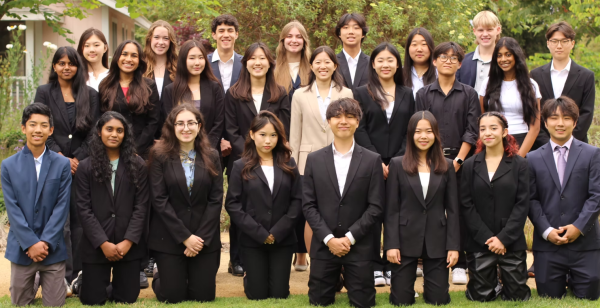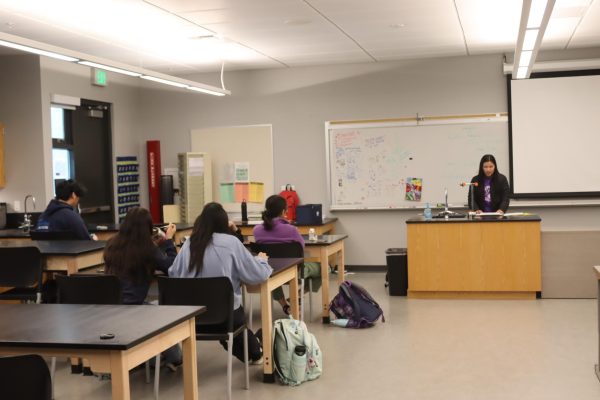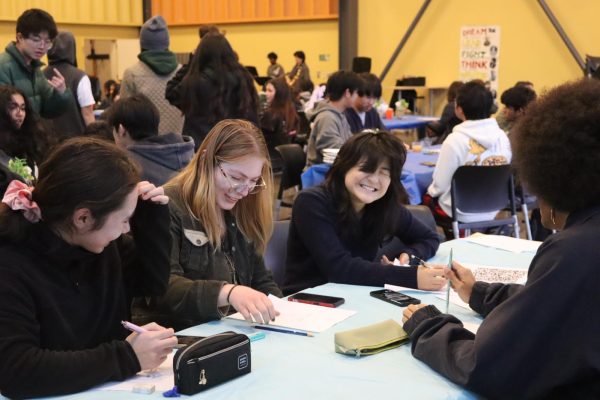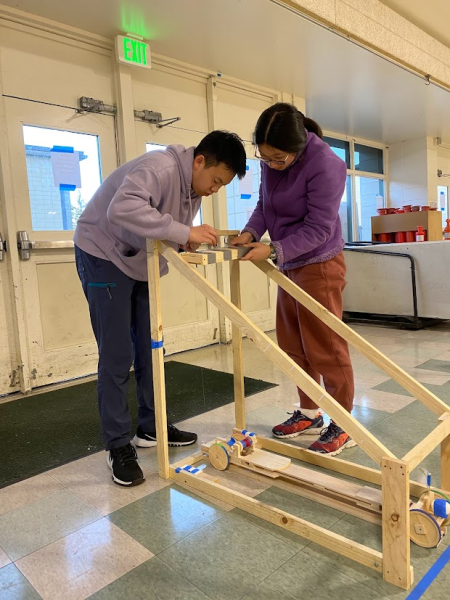Inside the social studies department: the stories behind the career
Kelly DiNucci and Christy Heaton share their teaching journeys
Although social studies can be a boring class for some students, social studies teachers Kelly DiNucci and Christy Heaton themselves said that there are many compelling aspects that draw them to the subject. DiNucci has taught for 10 years, while Heaton is in her 26 year teaching at HHS.
DiNucci’s late-blooming love for history
For DiNucci, history was not always a point of interest. It was actually the opposite. DiNucci said her experience in high school history classes was “dismal,” with her sophomore world history class being taught in an auditorium of 80 students.
“The teacher stood at the front of the room with an overhead projector and put up map after map,” DiNucci said. “We had a textbook we were supposed to follow along with. It was so awful.”
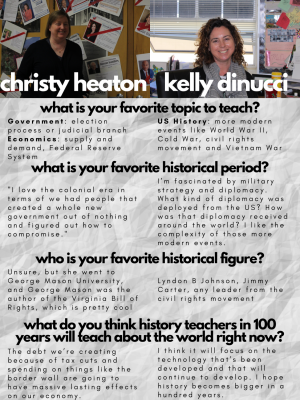
Kelly DiNucci and Christy Heaton share their history favorites.
It wasn’t until after she graduated high school that her attitude toward history took a positive turn as she was given more freedom to explore the subject.
“I could take charge of my own learning and explore paths that were not even mentioned to me in high school,” DiNucci said.
DiNucci’s path to become a teacher began in the social science program at San José State University.
DiNucci said she hopes that her class inspires students to be interested in the world around them.
“I would just hope at the most basic level, they leave with a curiosity about the world and their place in it,” DiNucci said. “It’s hard for a history teacher in high school because so few of our students are going to go out and turn history into a career, but it is an important part of being a well rounded, well educated adult.”
In her teaching, DiNucci emphasizes establishing a connection between students and the course content.
“I try to connect history to their lives as much as possible,” DiNucci said. “As human beings, if it doesn’t mean anything to us, we don’t connect with it.”
Most importantly, DiNucci has learned to adjust to and accommodate her students’ vast range of learning styles.
“Teaching is not one size fits all,” DiNucci said. “Students come in with varying degrees of knowledge and interest and curiosity, so as a teacher you have to have a lot of respect for not only what students are interested in but what their capacity for learning is.”
As for what history itself has taught her, DiNucci said it has opened her up to the concept of practicing compassion.
“History has taught me to be compassionate. History is a human story, period,” DiNucci said. “It’s taught me about compassion and connection. We are no different than anyone else in the world.”
Heaton hopes students retain knowledge of government for life
Heaton developed an interest in history and government at a young age. When she was 10 years old, her family visited colonial Williamsburg in Virginia, which sparked a fascination with the colonial era.
“We had people that created a whole new government out of nothing and figured out how to compromise,” Heaton said.
Having animated and passionate teachers inspired her to pursue history even further. As a junior, she took US History and sociology with the same teacher, who inspired her to become a history teacher herself, Heaton said.
While she said she recalls being “bored silly” in her government class in high school, she still took interest in government and politics and fulfilled these interests outside of class.
“There were the political conventions that happened before the presidential races and I remember watching those through the summer,” Heaton said. “The Iran Contra hearings were [also] on TV and I’d be watching those.”
After high school, Heaton attended George Mason University in Virginia because she wanted to be near Washington DC without actually being in it, she said.
After she worked in law offices for some time, Heaton soon discovered that she wasn’t interested in that line of work. However, when she worked as a teaching physician for kids at summer camps, she realized that she enjoyed interacting with kids, which eventually brought her on the path to becoming a teacher.
“As I explored different things I could do with government, and remembering my experience in high school, I [realized I] wanted to be a government teacher and activities director,” Heaton said.
In addition, Heaton said that she enjoys teaching government because of its lasting relevance in students’ lives.
“Look at what’s happening in the world,” Heaton said. “This is the one subject that affects every single person for the rest of their lives.”
Heaton pointed to the current state of the world – businesses closing, flights being affected, the stock market crashing and the world’s reaction to the novel coronavirus – as an example of why government and economics are such important subjects.
“[I want] to help students learn about how those things operate, how [they] can influence [the system] and how it actually matters who has the power in these situations [so that] the country comes out hopefully unscathed from something as horrible as this,” Heaton said.
Like DiNucci, Heaton strives to incorporate real world connections in her lessons to connect with students through the material.
Heaton incorporates current event presentations at the beginning of each class, where a student leads a class discussion on a topic of choice relating to either government or economics.
Heaton said she hopes her students walk away from her class with an understanding of how to access the political system for their benefit.
“I hope they’ll understand the importance of participation in the government and how to make good financial choices so they don’t end up in massive credit card debt at a young age and have that working knowledge of how things work and how they can access it,” Heaton said.



